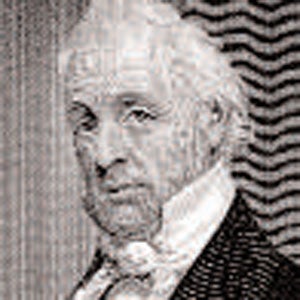
Your support helps us to tell the story
From reproductive rights to climate change to Big Tech, The Independent is on the ground when the story is developing. Whether it's investigating the financials of Elon Musk's pro-Trump PAC or producing our latest documentary, 'The A Word', which shines a light on the American women fighting for reproductive rights, we know how important it is to parse out the facts from the messaging.
At such a critical moment in US history, we need reporters on the ground. Your donation allows us to keep sending journalists to speak to both sides of the story.
The Independent is trusted by Americans across the entire political spectrum. And unlike many other quality news outlets, we choose not to lock Americans out of our reporting and analysis with paywalls. We believe quality journalism should be available to everyone, paid for by those who can afford it.
Your support makes all the difference.
Born: 17 April, 1791.
Died: 1 June, 1868.
Party: Democratic.
Religion: Presbyterian.
Age upon taking office: 65.
Height: 6ft.
Married to: n/a.
Children: None.
Nickname: "Old Buck".
Vice-President: John C Breckinridge.
Ran against: John C Frémont; Millard Fillmore.
Pierce's successor is another regular nominee for the title of worst ever president. A wealthy lawyer from Pennsylvania, he was tall, smart, eloquent and decent – but failed entirely to rise to the great political challenges of his time. After 40 unremarkable years in politics (which he may have entered as a distraction from a failed romance), he came to power largely on the basis that, having been out of the country as ambassador to the UK since 1853, he was untainted by the controversy over the Kansas-Nebraska Bill. Once elected, he was plainly out of his depth. He underestimated the long-term threat posed by the new Republican party, and he failed to understand that constitutional arguments about the rights of states would not close the widening rift over slavery because the Northern states would not accept them.
When the Supreme Court's notorious Dred Scott ruling established that slavery could not be legislated out of existence, even in the newly emerging territories, Buchanan felt confirmed in his view that the controversy was all but settled. ("May we not, then, hope that the long agitation on this subject is approaching its end...?" he had said in his inaugural address, a few days earlier.) He could not have been more wrong.
He tried to end the troubles in Kansas by urging the admission of the territory as a slave state, but succeeded only in enraging the Republicans and alienating many in his own party. His support for a draft of the Kansas constitution (eventually rejected by Congress) that allowed slavery was further evidence of how out of touch he was.
Further evidence of Buchanan's inadequacy can be found in his lack of response to the financial panic of 1857 (caused by the failure of the Ohio Life Insurance Company of Cincinnati); and in the fact that, while scrupulously honest himself, he presided over an administration that was notoriously corrupt.
In 1858, the Republicans won a plurality in the House, and the Federal Government reached a stalemate. By 1860, factional infighting had reached such a level that the Democratic party split, with both northern and southern branches nominating presidential candidates. This made victory for Abraham Lincoln and the Republicans a foregone conclusion – even though hardline southern states were determined to secede from the Union rather than accept a Republican administration.
Lincoln duly won, and, in Buchanan's final months, seven southern states withdrew to form the Confederate States of America. As they began to seize federal property, Buchanan had no idea how to respond. He denied the states' legal right to secede but also held that the Federal Government could not legally prevent them from doing so. He therefore did little beyond hoping for the best, effectively leaving Fort Sumter in Charleston to mercy of the Confederates.
He handed over power in March 1861, and spent the remaining seven years of his life in obscure retirement in Wheatland, his Pennsylvania home.
In his own words
"My dear sir, if you are as happy on entering the White House as I on leaving, you are a very happy man indeed." (To Abraham Lincoln.)
"I believe [slavery] to be a great political evil and a great moral evil... But, while I entertain these opinions, I know it is an evil at present without a remedy... one of those moral evils from which it is impossible to escape without the introduction of evils infinitely greater."
In others' words
"There is no such person running as James Buchanan. He is dead of lockjaw. Nothing remains but a platform and a bloated mass of political putridity." Thaddeus Stevens
Minutiae
His head was almost invariably cocked to the left. This was the result of an unusual sight disorder, in which one eye was short-sighted and the other long-sighted.
James Buchanan was the only US president who never married. Harriet Lane, his niece, acted as his First Lady.
Although his failure to marry probably resulted from the heartbreaking failure of a brief engagement (in his twenties, to Anne Coleman), rumour-mongers in Washington were quick to suggest another explanation, referring to Buchanan and his close friend William Rufus King as "Miss Nancy and Aunt Fancy".
He enjoyed playing cards and drinking whiskey, but never seemed to get drunk.
Join our commenting forum
Join thought-provoking conversations, follow other Independent readers and see their replies
Comments